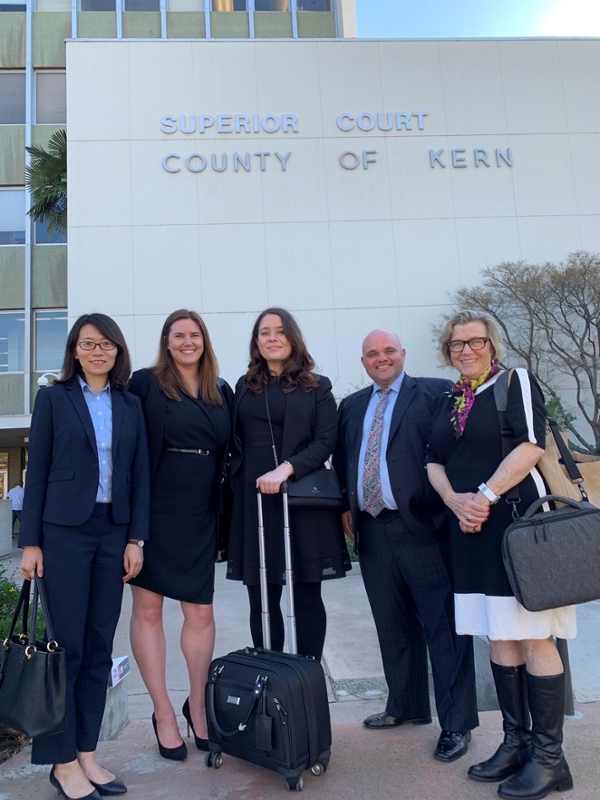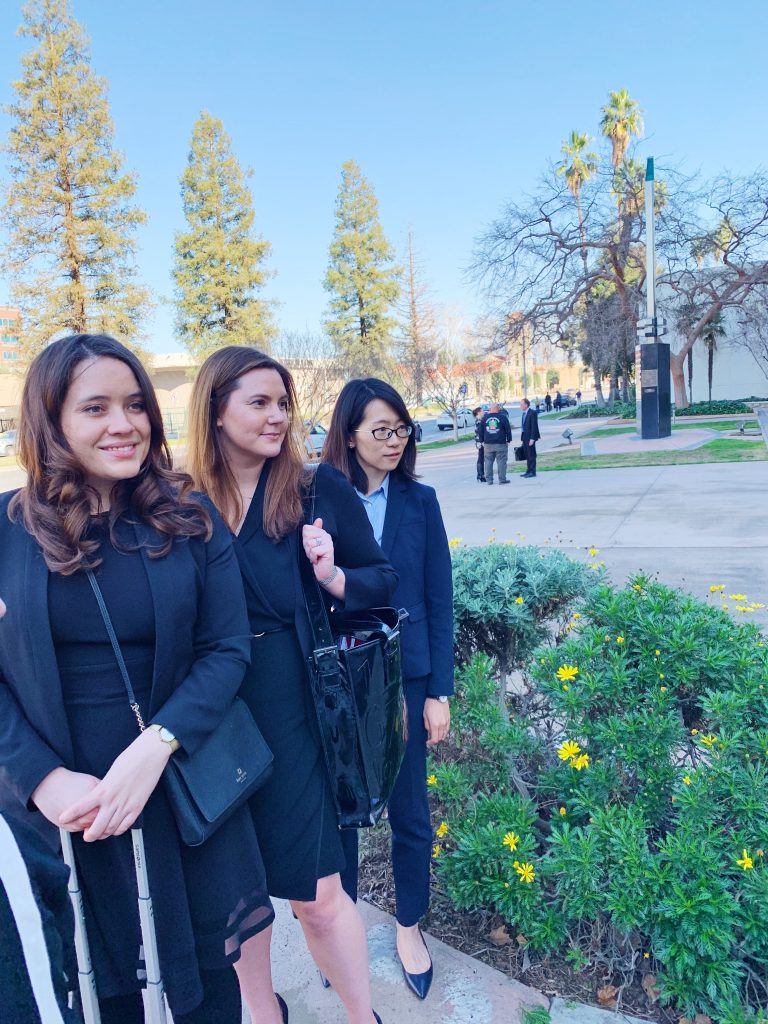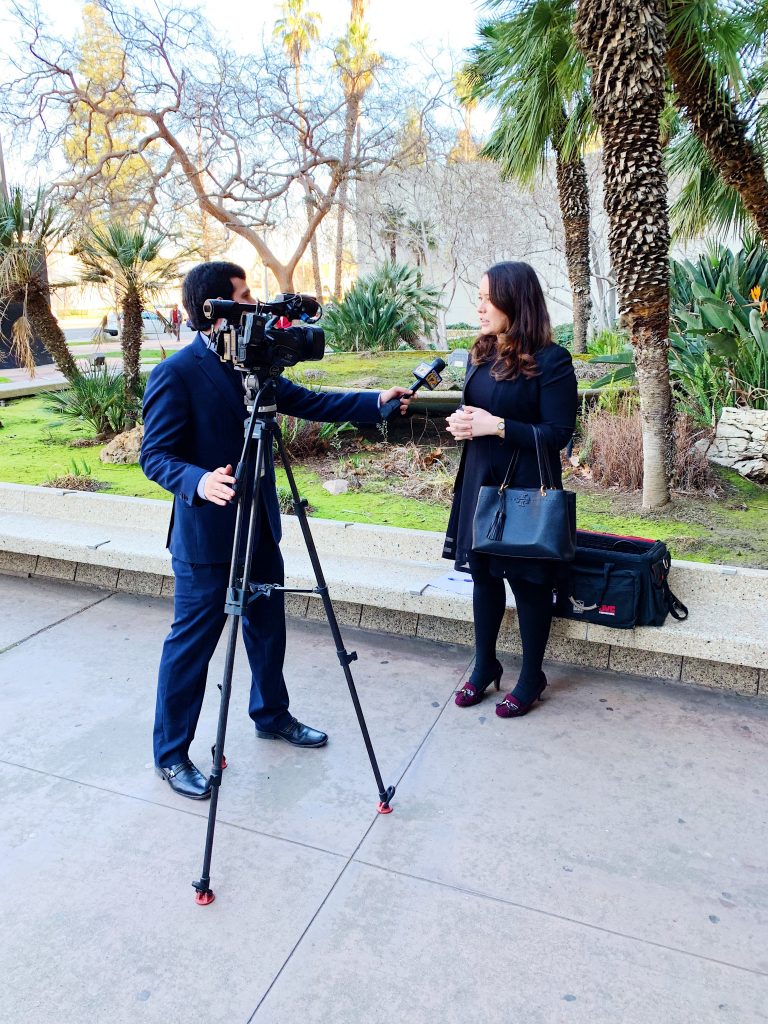by Emily Asgari
In a big win for its namesake cause, the First Amendment Team from the University of California School of Law’s Intellectual Property, Arts, and Technology Clinic successfully advocated on behalf of client Anthony Esposito, a local Bakersfield journalist, who last summer was the subject of a restrictive gag order preventing Mr. Esposito from writing or even talking about the highly publicized criminal case of People v. Perez. Last Friday, after oral argument by the IPAT Clinic’s Cassie Doutt, the court clarified that the gag order does not apply to Mr. Esposito and that he was free to publish stories about the case again.

Left to Right: IPAT students Shanxi Feng, Emily Asgari, and Cassie Doutt, the clinic’s client TJ Esposito, and Professor Susan Seager.
In July 2018, Bakersfield news publisher Anthony “T.J.” Esposito received a letter from the Kern County District Attorney’s office ordering him not to make any public statements about the controversial criminal prosecution of Kern County Supervisor Leticia Perez. The prosecutor told Mr. Esposito that he was gagged by the court’s Protective Order Against Publicity because Mr. Esposito was a potential witness in the Perez case, and the court had ordered all witnesses not to talk about the case. But as prosecutors would later admit, they were wrong. In fact, Mr. Esposito was not a witness. But out of fear that he would be sanctioned by the court, he stopped publishing about the case of People v. Perez for the six months following since receiving the letter.
Last Friday, the all-woman student First Amendment Team made the three-hour drive from Irvine along winding highways and through pristine green farmland to the Kern County Superior Court in Bakersfield. The purpose of our journey was to persuade a judge to clarify that the court’s gag order did not apply to Mr. Esposito or to vacate the order in its entirety.

The Spring 2019 IPAT First Amendment Team. (Left to Right) Cassie Doutt, Emily Asgari, and Shanxi Feng
Upon entering the courtroom, the local media interest in the People v. Perez criminal case was clear, with several imposing television cameras already set up and ready to capture court-approved visual images of the hearing. At the counsel table, there was no designated seat for representative of non-parties like Mr. Esposito, but the prosecutor kindly gave up his seat at the table for Professor Seager and student Cassie Doutt. Shanxi Feng and I found seats in the front row along with Mr. Esposito.
The hearing began with both the prosecution and Ms. Perez’s defense attorney, H.A. Sala, telling the judge that they had no intention of calling Mr. Esposito as a witness in the case. Judge Thomas Clark turned to Cassie, asking her why the clinic was asking him to clarify the gag order when both parties agreed Ms. Esposito was not a witness, which meant he was not bound by the gag order directed to witnesses.
This was precisely the question posed to Cassie by Professor Seager and other clinic students in the team’s moot-court style preparation for the hearing. Cassie responded without hesitation, and argued that both the ambiguity of the prosecution’s letter and the gag order created uncertainty that “chilled” Mr. Esposito’s speech. Cassie told the judge that Mr. Esposito had not published any stories on the People v. Perez case since receiving the prosecutor’s letter six months ago. Judge Clark agreed to clarify the order, but stated that if Mr. Esposito were named as a witness the issue would have to be revisited. Judge Clark stated if Mr. Esposito is subpoenaed as a witness, “I’m sure I will have papers from you in front of me again.”
The team left the courtroom ecstatic, followed not soon after by the prosecutor and Mr. Sala as well, their hearing lasting but ten or fifteen minutes. As we stood waiting for the elevator, Mr. Sala complemented Cassie and the team on a job well-done. He remarked at how impressed he was that UCI provided students with such wonderful opportunities to experience real legal work and represent real clients in court. Professor Seager, who couldn’t let go of the idea that the entire gag order was unconstitutional, parried with Mr. Sala that although this was a great win, the entire gag order was still unconstitutional and should be vacated. He simply replied, “I didn’t ask for it.”
Upon exiting the courthouse, Cassie provided impromptu interviews to the local media in both English and Spanish. Mr. Esposito, ungagged and excited about his win, gave an interview to local NBC news affiliate KGET 17, stating, “Today was a big win for journalism and the first amendment.” Mr. Esposito then rushed to his computer and quickly posted his first story about the People v. Perez case after six months of silence.

IPAT Clinic student Cassie Doutt, who argued on behalf of the clinic, answering questions in English and Spanish an interview with the local press.
This victory is the result of nearly two semesters’ worth of student work on behalf of Mr. Esposito. Thank you to Fall 2018’s clinic students Michelle Chea, Reece Foster, Ashley Yee, and Julia Gaffney, and IPAT’s Director, Professor Jack Lerner, for their contribution to this project. The clinic is delighted to have helped further the ideals set out in the First Amendment.